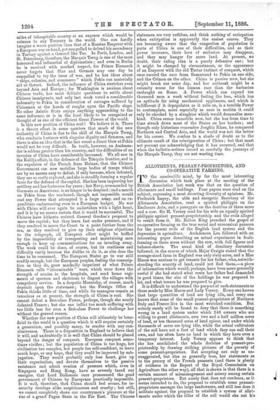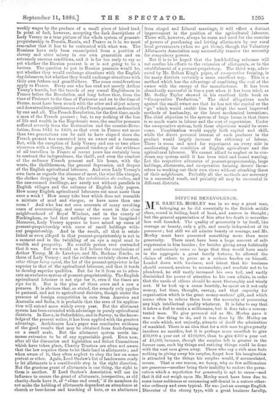ALLOTMENTS, PEASANT-PROPRIETORS, AND CO-OPERATIVE FARMING.
TO the unscientific mind, by far the most interesting discussion which took place at the meeting of the British Association last week was that on the question of allotments and small holdings. Four papers were read on the subject, expressing a most diverting diversity of opinions. Mr. Frederick Impey, the able and energetic Secretary of the Allotments Association, read a spirited philippic on the Enclosure Acts, and a panegyric on the doctrine of three acres and a cow. Sir H. Verney read for his wife an equally spirited philippic against peasant-proprietorship and the evils alleged to result from it. Mr. Bolton King preached the gospel of co-operative farming as the true social and economical panacea for the present evils of the English land system and the depression in agriculture. Archdeacon Lea followed with an interesting paper describing an actual experiment in fruit- farming on three acres without the cow, with full figures and balance-sheets. The usual kind of desultory discussion followed, in the course of which Major Craigie stated that the average-sized farm in England was only sixty acres, and a Miss Mason was anxious to get tenants for her father, who, notwith- standing the scarcity of land, could not find them,—a piece of information which would, perhaps, have been more generally useful if she had stated what rents her father had demanded in good times, the size of the holdings he was prepared to let, and what tenure he was prepared to give.
It is difficult to understand the purport of such statements as those made by Miss Mason and Lady Verney. Every one knows that large quantities of land are lying idle, and every one knows that some of the small peasant-proprietors of Northern Italy and France live in the most wretched condition. But nobody surely will be found to deny that there is something wrong in a land system under which 248 owners who are willing to grant allotments, own two and a half million acres of land, or ten thousand acres of land apiece, and under which thousands of acres are lying idle, while the actual cultivators of the soil have not a foot of land which they can call their own, and too often have no land in which they have even a temporary interest. Lady Verney appears to think that she has annihilated the whole doctrine of peasant-pro- prietorship by drawing striking pictures of the poverty of some peasant-proprietors. But accepting not only as un- exaggerated, but also as generally true, her statements as to the penury of the French peasants (and there is plenty of evidence in the Report of the Royal Commission on Agriculture the other way), all that is shown is that there is a certain amount of mismanagement and misery among certain peasant-proprietors. But surely that does not condemn, as it seems intended to do, the proposal to establish some peasant- proprietors amongst the large landowners, and still less does it militate against the proposal to establish a system of allot- ments under which the tiller of the soil would eke out his
weekly wages by the produce of a small piece of hired land. In point of fact, however, accepting the dark descriptions of Lady Verney as a true picture of the whole system of peasant- proprietorship in Prussia, Russia, and France as it is, we must remember that it has to be contrasted with what was. The Russians have only been emancipated from a position of slavery and utter misery in our own generation and on extremely onerous conditions, and it is far too early to say as yet whether the Russian peasant is or is not going to be a success. The question to put to Russian peasants would be, not whether they would exchange situations with the English day-labourers, but whether they would exchange situations with their own fathers and grandfathers. The same considerations apply to France. Every one who has read not merely Arthur Young's travels, but the travels of any casual Englishman in France before the Revolution, and long before that, from the time of Froissart to the time of Fortescue and on to the time of Sterne, must have been struck with the utter and abject misery and downtrodden spiritlessness of theFrench peasant, as described by one and all. The French Revolution, for the first time, made a man of the French peasant ; but, to say nothing of the loss of life and wealth in the Napoleonic wars, the smaller peasants suffered severely from the Restoration and the counter-Revo- lution, from 1815 to 1830, so that even in France not more than two generations can be said to have elapsed since the French peasant was converted into an owner and a freeman. But, with the exception of Lady Verney and one or two other observers with a theory, the general tendency of the evidence of all travellers in France of recent years has certainly been to contrast the independence, the thrift, and even the comfort of the ordinary French peasant and his home, with the waste, the thriftlessness, the general depression, and despair of the English agricultural labourer. And even Lady Verney's own facts as regards the absence of meat, the wine like vinegar, the clothes dropping in rags, the cohabitation du cochon, and the one-roomed dwellings, are surely not without parallels in English villages and the columns of English daily papers. How many English agricultural labourers eat meat more than once a week ? How many take beer which does not resemble a mixture of mud and vinegar, or have more than one room ? And who has not seen accounts of many revolting cases of overcrowding, and some of the worst in the close neighbourhood of Royal Windsor, and in the county of Buckingham, so bad that nothing worse can be imagined ? Moreover, Lady Verney appears to have mixed up cases of peasant-proprietorship with cases of small holdings with- out proprietorship. And in the result, all that is estab- lished or even alleged is that peasant-proprietorship is not in a moment and in the twinkling of an eye a royal road to wealth and prosperity. No sensible person ever contended that it was. But we would as lid believe the conclusions of Arthur Young, M. de Laveleye, and Mr. Barham Zincke, as those of Lady Verney ; and the evidence certainly shows that, other things being equal, the lot of the peasant-proprietor is far superior to that of the agricultural labourer, and that it tends to develop superior qualities. But far be it from us to advo- cate an exclusive system of peasant-proprietorship. The English agricultural labourer is not ripe for it, even if the times are ripe for it. Nor is the plan of three acres and a cow a panacea. It is obvious that, so stated, the remedy only applies to pastoral, and not to agricultural districts, though under the pressure of foreign competition in corn from America and Australia and India, it is probable that the area of its applica- tion will extend more widely every year. But the allotment system has been extended with advantage in purely agricultural districts. In Essex, in Oxfordshire, and in Surrey, to the know- ledge of the present writer, it has been applied with the greatest advantage. Archdeacon Lea's paper was conclusive evidence of the good results that may be obtained from fruit-farming on a small scale. But the allotment system needs im- mense extension to be of any appreciable good. Even now, after all the discussion and legislation and Select Committees which have taken place, Charity Trustees are often not aware that the law requires them to let their land in allotments ; and when aware of it, they often neglect to obey the law on some pretext or other. Again, Lord Onslow's list of landowners ready to let allotments is a considerable step in the right direction. But the gracious grant of allotments is one thing, the right to them is another. If Lord Onslow's Association will use its influence to ensure the grant of allotments, irrespective, as old charity-deeds have it, of " clime and creed," if its members do not make the holding of allotments dependent on attendance at church or beer-house and touching of hats, or on abstinence from chapel and Liberal meetings, it will effect a distinct improvement in the position of the agricultural labourer. There will, however, always be room and need for the exercise of powers of purchasing and letting allotments by our rural local governments (when we get them), though the Voluntary Allotments Association may successfully remove the necessity for compulsory powers. But it is to be hoped that the land-holding reformer will not confine his efforts to the extension of allotments, or to the establishment of a peasant-proprietary. The third way, advo- cated by Mr. Bolton King's paper, of co-operative farming, is for many districts certainly a more excellent way. This is a method which has the advantage of combining the zeal of the owner with the energy of the manufacturer. It has been abundantly successful in times past when it has been tried, as Mr. Sedley Taylor showed in his excellent little book on " Co-operative Production." The chief allegations made against the small owner are that he has not the capital or the "go" which would enable him to adopt the most improved methods of husbandry, or the latest mechanical inventions. The chief objection to the system of large farms is that there is so much waste in labour and the cost of supervision. Under the co-operative system, both these objections would be over- come. Combination would supply both capital and skill, while the direct personal interest of each producer in the product would largely increase the efficiency of labour. There is room and need for experiment on every side in ameliorating the condition of English agriculture and the agricultural labourer. We cannot afford to neglect or to con- demn any system until it has been tried and found wanting. Let the respective advocates of peasant-proprietorship, large holdings, allotments, and co-operative farming devote them- selves to working out their own views without attacking those of their neighbours. Probably all the methods are necessary to a successful result, and probably all may be successful in different districts.



































 Previous page
Previous page